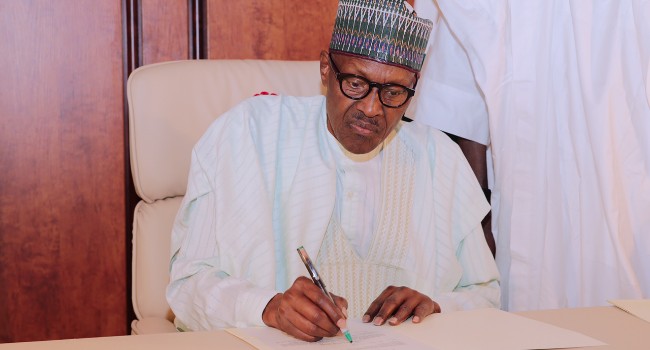News
Buhari signs Finance Bill 2019 into law

President Muhammadu Buhari on Monday said he had signed the Finance Bill, 2019, into law.
The president made the announcement in a series of tweets posted on his verified Twitter handle-@MBuhari.
He said, “I am pleased to announce that this morning I signed into law the Finance Bill, 2019.
“We introduced the Bill alongside the 2020 Budget, to:
-Reform Nigeria’s tax laws to align with global best practices;
-Support MSMEs in line with our Ease of Doing Business Reforms;
-Incentivize investments in infrastructure and capital markets;
-Raise Government revenues.
“This is the first time, since the return of democracy in 1999, that a Federal Budget is being accompanied by passage of a Finance Bill specially designed to support its implementation, and to create a truly enabling environment for business and investment by the private sector.
“I thank the leadership and members of the Ninth National Assembly for the hard work and support that have gone into the passage of the landmark Deep Offshore and Inland Basin PSC Amendment Bill, and the Finance Bill; both vital to the successful implementation of the 2020 Budget.”
The Special Adviser to the President on Media and Publicity, Femi Adesina, who later confirmed the development in a statement in Abuja, said there would be more revenue to finance key government projects in health, education and critical infrastructure.
The signing of the bill, according to the statement, followed its passage by the National Assembly and subsequent forwarding of the document to the President for assent.
The President had presented the Finance Bill alongside the 2020 Appropriation Bill to the National Assembly in November last year.
He said: “This Finance Bill has five strategic objectives, in terms of achieving incremental, but necessary, changes to our fiscal laws.
“These objectives are – promoting fiscal equity by mitigating instances of regressive taxation; reforming domestic tax laws to align with global best practices;
“Others are – introducing tax incentives for investments in infrastructure and capital markets; Supporting Micro, Small and Medium-sized businesses in line with our Ease of Doing Business Reforms; and Raising Revenues for Government.
“The draft Finance Bill proposes an increase of the VAT rate from five percent to 7.5 percent, as such, the 2020 Appropriation Bill is based on this new VAT rate.”
Join the conversation
Support Ripples Nigeria, hold up solutions journalism
Balanced, fearless journalism driven by data comes at huge financial costs.
As a media platform, we hold leadership accountable and will not trade the right to press freedom and free speech for a piece of cake.
If you like what we do, and are ready to uphold solutions journalism, kindly donate to the Ripples Nigeria cause.
Your support would help to ensure that citizens and institutions continue to have free access to credible and reliable information for societal development.




















